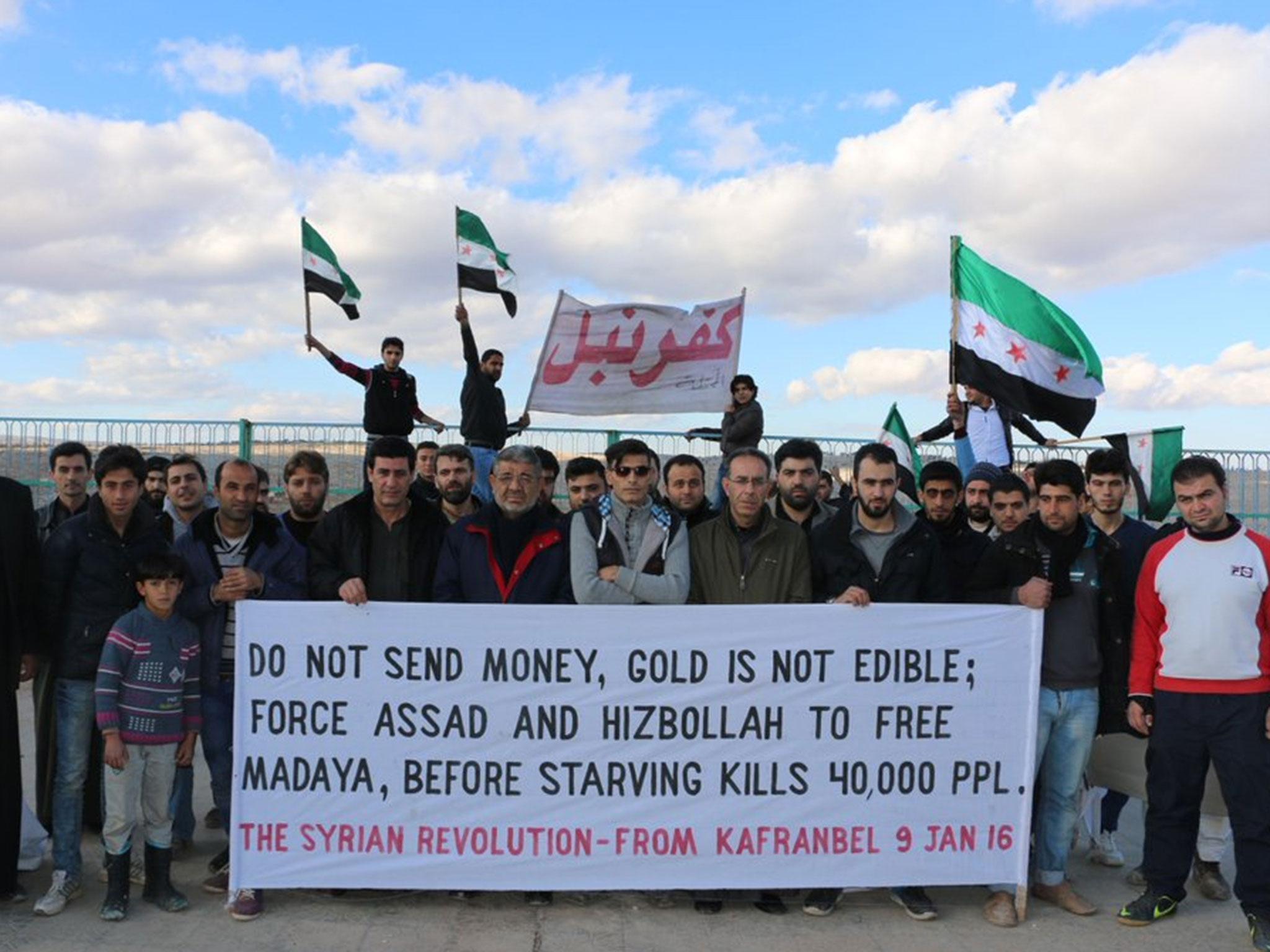Syria activist who led anti-Assad protest movement assassinated by gunmen in hometown
Raed Fares was known for making poignant banners and sharing them on social media to spread the message of peace and democracy

Your support helps us to tell the story
From reproductive rights to climate change to Big Tech, The Independent is on the ground when the story is developing. Whether it's investigating the financials of Elon Musk's pro-Trump PAC or producing our latest documentary, 'The A Word', which shines a light on the American women fighting for reproductive rights, we know how important it is to parse out the facts from the messaging.
At such a critical moment in US history, we need reporters on the ground. Your donation allows us to keep sending journalists to speak to both sides of the story.
The Independent is trusted by Americans across the entire political spectrum. And unlike many other quality news outlets, we choose not to lock Americans out of our reporting and analysis with paywalls. We believe quality journalism should be available to everyone, paid for by those who can afford it.
Your support makes all the difference.A prominent Syrian activist who led a protest movement against the regime of Bashar al-Assad has been assassinated by unknown gunmen.
Raed Fares, 45, was a frequent critic of Islamist extremists in Syria and the driving force behind a years-long pro-democracy campaign in the small town of Kafranbel.
The campaign was known for its witty and heartfelt banners that were shared on social media to draw attention to Syria’s plight.
As Syria’s civil war descended deeper into violence and polarisation, Fares and his cohorts in Kafranbel became known as the “conscience of the revolution” for their stubborn adherence to the original, democratic ideals of the Syrian uprising.
They held weekly demonstrations in the town calling out everyone who stood in the way of a democratic Syria, including jihadist fighters who held sway in the area.
During a meeting in Istanbul with Western journalists, he acknowledged that his forays to Syria were becoming increasingly dangerous, and that he knew extremist groups who dominate parts of Idlib province were gunning for him.
Over coffee, he also voiced dismay over the fate of the Syrian uprisings. He knew that his campaign was likely to fail, but vowed to go on.
“If I die, at least I will die in Syria,” he said.
He had been abducted and targeted numerous times by extremist Islamist groups, including Hayat Tahrir al-Sham, a former affiliate of Al Qaeda. In 2014, Isis gunmen opened fire on his car with automatic rifles, leaving him with a punctured lung. He continued with his work, undeterred.
“They’ve tried that five times already,” he recently told the BBC of the attempts on his life. “If it happens, it happens. But they haven’t succeeded yet. I try to survive, but if I can’t, it’s OK.”
He was reportedly gunned down by masked men in Kafranbel just before Friday prayers in his hometown. Hammoud Juneid, another activist, was also killed.
The banners that Fares created often tried to reference events happening elsewhere in the world and connect them to the war in Syria. They were written in Arabic, Turkish and broken English, but their messages were clear and direct.
“Charleston shootings are the other face of Assad massacres. Terrorism has no nationality, or religion,” said one in 2015, following a mass shooting at a church in North Carolina.
“We stand in solidarity with the oppressed who cannot breathe #blaklivesmatter,” read another, the year before.
Often, the messages were laced with an arresting humour. One banner addressing the former UN envoy for Syria, Staffan de Mistura, read: “De Mistura ideas to reality are like windmills to Don Quixote.”
Fares was also known for the radio station he founded in the town in 2013. Radio Fresh is one of the few independent stations broadcasting from inside the country, and has been the target of repeated raids by extremist groups in the area who objected to the music they played, among other things.
The station was supported in part by US “stabilisation aid” to humanitarian groups in Syria. When that funding was withdrawn by President Donald Trump’s administration earlier this year, Fares wrote an impassioned defence of his work in an op-ed for the Washington Post.
“In the absence of peaceful, democratic political voices, terrorists have been able to convince Syria’s vulnerable youth that violence and destruction can somehow pave the way to stability,” he wrote. “Civil society groups and independent media are working tirelessly to oppose these messages – in ways that resonate with local audiences. Syria’s democratic future relies on our success.”
A number of Syrian activists blamed the killing on Hayat Tahrir al-Sham, the most powerful rebel group in Idlib province.
Yassin Swehat, a journalist and co-founder of the opposition Jumhuriya online magazine, tweeted: “The revolution has been assassinated by the lowly al-Nusra Front,” using the group’s former name.
Fadel Abdul Ghany, founder and chair of the Syrian Network for Human Rights, described the killing as a “tragedy”.
Fares’s last online post was published on his Facebook page on 5 October. It showed a video of a protest in Kafranbel, with the words: “The people of Kafranbel are in Huriyah [Freedom] Square and voices are chanting: The people want the downfall of the regime. We started this in 2011 and we are continuing on. Our loyalty to the martyrs and detainees has increased our determination.”
Join our commenting forum
Join thought-provoking conversations, follow other Independent readers and see their replies
Comments